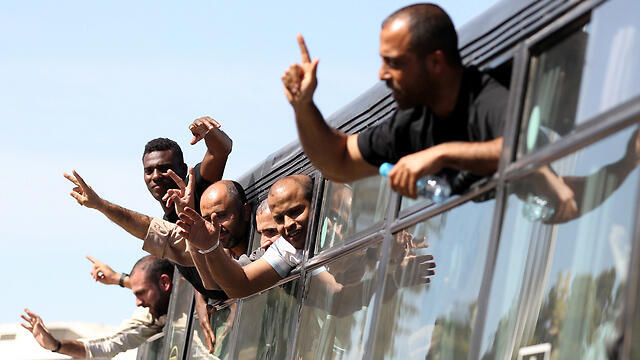Getting your Trinity Audio player ready...
The cash-strapped Palestinian Authority denied on Thursday U.S. allegations it had increased payments to families of terrorists in Israeli jails, and said the main obstacle to peace was Israeli occupation of Palestinian land.
and Twitter
U.S. officials have criticized the PA's prisoner stipends as fanning Palestinian violence, and U.S. President Donald Trump's Middle East envoy Jason Greenblatt said the PA had increased those payments by some 11 percent in the first months of 2019.
"PA increased pay to murderers by over 11% at the same time as they slash pay to their government workers and police," Greenblatt tweeted on Wednesday. "More harm to Palestinians & to peace!"
The Palestinian Finance Ministry rejected the accusation as "absolutely false and hypocritical" and said Washington was lending financial support to Israel's occupation of the West Bank.
"It is known to everyone that Israel's illegal colonial settlements, funded by American taxpayer money, continue to be the obstacle to peace," a ministry spokesman said.
PA fiscal records show no marked increase in what they refer to as "assistance for prisoners and detainees". Monthly payments were around 42 million shekels ($11.85 million) in December 2018, decreasing to 38.4 million shekels ($10.83 million) in April 2019.
Payments spiked to 75 million shekels ($21.15 million) in May 2019, which a ministry spokesman attributed to arrears payments and a bonus for the Muslim holy month of Ramadan. Civil servant salaries also spiked in May. Later data was not available.
2 View gallery


Palestinian security prisoners freed by Israel in the 2011 Gilad Shalit prisoner exchange
(צילום: EPA)
The PA, which exercizes limited self-rule in the West Bank, has been grappling with a financial crisis since it refused in February to accept tax transfers from Israel after Israeli authorities cut the portion designated for prisoners' families.
Under interim peace accords, Israel collects taxes on imports into the West Bank and in the Gaza Strip, an enclave under Palestinian Islamist rule since 2007, and makes monthly transfers of the proceeds to the PA.
The tax transfers of around 700 million ($197 million) shekels per month make up about half of the PA's budget, and the government has slashed civil servant salaries since March to weather the crisis.
Palestinian President Mahmoud Abbas has refused to accept the partial tax remittances from Israel, saying the PA is entitled to all the money under interim peace deals.
The mounting financial pressures on the PA have sent its debt soaring to $3 billion, and led to a severe contraction in its estimated $13 billion GDP economy, according to the PA's top central banker.


